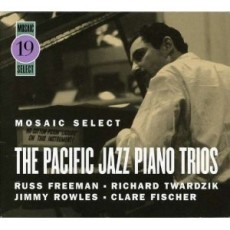
Daily Dose Of Jazz…
Russell Donald Freeman was born on May 28, 1926 in Chicago, Illinois. He was initially classically trained, but later turned toward jazz of a largely bop style. His reputation as a jazz pianist grew in the 1940s when he worked with Art Pepper, Shorty Rogers and Chet Baker. Among his best work is his extensive collaboration with Shelly Manne, especially in the 1950s and 1960s.
Freeman wrote “The Wind” with original lyrics by Jerry Gladstone and was performed as an instrumental piece during the 1950s and 1960s by the likes of Chet Baker, Leo Wright and Stan Getz as well as sung by vocalist June Christy. Russ’s piano is featured on the 1954 recording of “The Wind,” which has since become a jazz standard, for the album Chet Baker With Strings and Deep I A Dream: The Ultimate Chet Baker Collection, the latter he is featured on seven cuts. In 1991, Mariah Carey wrote her own lyrics to Freeman’s “The Wind” for her album Emotions.
Russ Freeman, bebop and cool jazz pianist, remained busy in music throughout his life, transitioning from jazz pianist to film scoring and composition before his death on June 27, 2002 in Las Vegas, Nevada.
More Posts: piano
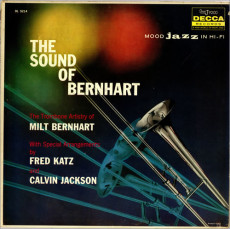
Daily Dose Of Jazz…
Milt Bernhart was born on May 25, 1926 in Valparaiso, Indiana and began his musical career with the tuba. By high school he switched to trombone and by 16 he was working in Boyd Raeburn’s band and later gigged with Teddy Powell.
After a tour in the Army he worked, off and on, with Stan Kenton for the next ten years. He is perhaps most associated with Kenton, but in 1955 he had his first album as a leader. In 1986 he was elected President of the Big Band Academy of America.
Widely known as a mild-mannered and humorous musician his brief period with Benny Goodman was one area that brought out his ire. Except for the Army’s basic training, Milt indicates working with Goodman was “the bottom” of his first 23 years of life, referring to him as a bore and could not abide Goodman’s public humiliation of tenor saxophonist Wardell Gray or his segregated treatment at a Las Vegas club.
West coast jazz trombonist Milt Bernhart, who supplied the exciting solo heard in the middle of Sinatra’s popular 1956 recording of “I’ve Got You Under My Skin” conducted by Nelson Riddle, passed away on January 22, 2004 in Glendale, California.26-2004
More Posts: trombone
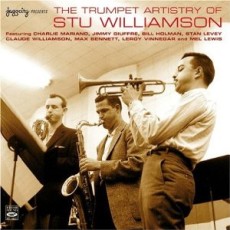
Daily Dose Of Jazz…
Stu Williamson was born on May 14, 1933 in Brattleboro, Vermont and is the younger brother of jazz pianist Claude Williamson. The trumpeter relocated to Los Angeles in 1949 and became a regular on the West Coast scene. He played with Woody Herman, Mel Lewis-Pepper Adams Quintet, Elmo Hope, Lennie Niehaus, Billy May and Charlie Barnet the first half of the Fifties.
Williamson played a significant role in Stan Kenton’s Orchestra, Howard Rumsey’s Lighthouse Café All-Stars and Terry Gibbs’s Dream Band. Between 1954 and 1958 Williamson played intermittently with Shelly Manne and was a ubiquitous session player up until 1968.
Although he had a beautiful, rich, round tone and his ability to create melodic solos full of invention, power and clarity gave him the opportunity to front small groups and big bands. Disappearing from the jazz scene after battling drug addiction for much of his life, including for years after he left the music. Trumpeter Stu Williamson passed away on October 1, 1991 in Studio City, California.
More Posts: trumpet
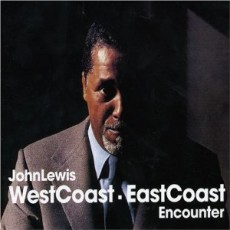
Daily Dose Of Jazz…
John Aaron Lewis was born in LaGrange, Illinois on May 3, 1920 but was raised in Albuquerque, New Mexico. He learned classical music and piano from his mother starting at the age of seven, then continued his musical training at the University of New Mexico and also studied anthropology. He served in the Army stationed in France during World War II and during his three-year tour of duty he met and performed with Kenny Clarke. Together they formed a band and in the bop style, John composed and arranged.
After the war he went to New York where he found work in the 52nd Street clubs with Allen Eager, Hot Lips Page and others. This led to him joining dizzy Gillespie’s bop-style big band and further developing his skill as a composer and arranger while matriculating through the Manhattan School of Music. He soon returned to Europe on tour, remained a continued to write and study piano. By ’48 he was back in the States playing with Charlie Parker, Illinois Jacquet, Lester Young, Miles Davis and Ella Fitzgerald.
Lewis, vibraphonist Milt Jackson, drummer Kenny Clarke, and bassist Ray Brown had been the small group within the Gillespie big band that played their own short sets when the brass and reeds needed a break. This led to the foursome forming a full-time working group in 1950, known at first as the Milt Jackson Quartet. After replacing Brown with Percy Heath the name was changed to the Modern Jazz Quartet and assuming the role of musical director from 1954 to 1974, John oriented it toward a quiet, chamber style of music that found a balance between his gentle, almost mannered compositions and Jackson’s more elemental writing and playing.
Over a long and illustrious career, John directed the School of Jazz at the Music Inn, was musical director for the Monterey Jazz Festival from 1958 to 1982, taught at City College of New York and Harvard University, rejoined the re-formed MJQ, led his own sextet, founded the American Jazz Orchestra, participated in Re-Birth of the Cool, was involved in various Third Stream Projects all while continuing to teach, compose and perform.
John Lewis, conservative bop pianist, composer, arranger and musical director for the Modern Jazz Quartet passed away in New York City on March 29, 2001.
More Posts: piano
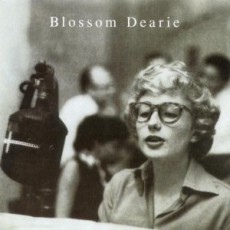
Daily Dose OF Jazz…
Blossom Dearie was born April 28, 1924 in East Durham, New York and as a child she studied Western classical piano but switched to jazz in her teens. After high school Dearie moved to New York City to pursue a music career and began to sing in groups such as the Blue Flames with the Woody Herman Orchestra and the Alvino Rey’s Blue Reys before starting her solo career.
She moved to Paris in 1952 and formed a vocal group, the Blue Stars of Paris, which included Michel Legrand’s sister Christine and Bob Dorough. In 1954 the group had a hit in France with a French version of “Lullaby of Birdland”. The Blue Stars would later evolve into the Swingle Sisters. Interestingly, on her first solo album released two years later, she plays the piano but does not sing.
After returning to the U.S. Blossom, Dearie made her first six American albums as a solo singer and pianist for Verve Records in the late 1950s and early 1960s, mostly in a small trio or quartet setting. In 1962, she recorded a radio commercial for Hires Root Beer. Through the Sixties she recorded with orchestra, performed in supper clubs around New York, appeared at Ronnie Scott’s in London and recorded four albums in the UK.
After a period of inactivity, by the ‘’70s she established her own label, Daffodil Records, lent her voice to “Mother Necessity” and “Figure Eight” on “Schoolhouse Rock!” and she collaborated with Johnny Mercer on one of his final songs “My New Celebrity Is You”. Her voice and songs have been featured in such films as Kissing Jessica Stein, The Squid and the Whale, My Life Without Me and The Adventures of Felix.
Blossom Dearie, vocalist, pianist and one of the last remaining supper-club performers, continued to perform in clubs until shortly before she passed away on February 7, 2006 at age 84 in Greenwich Village, New York.


